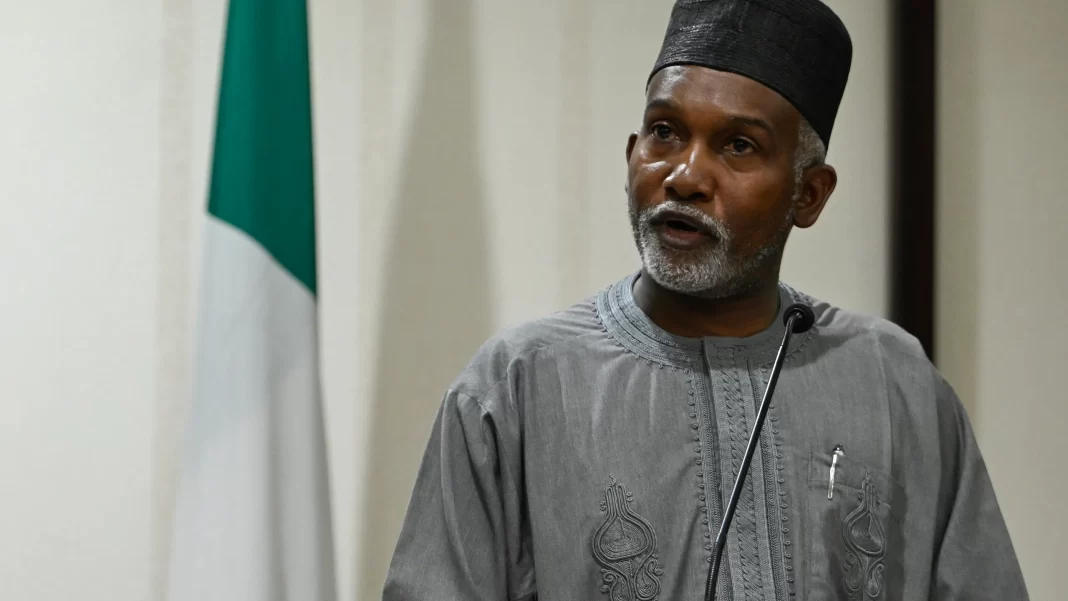ABUJA, Nigeria — Nigeria’s Minister of Foreign Affairs, Ambassador Yusuf Tuggar, has confirmed that the U.S. government’s recent threat of tariff hikes and revised visa restrictions for Nigerian citizens are linked to Abuja’s refusal to accept Venezuelan deportees — including convicted prisoners — from the United States.
Speaking on Politics Today, a primetime programme on Channels Television, Tuggar said the U.S. is pressuring African nations, including Nigeria, to serve as alternative destinations for Venezuelans facing deportation under President Donald Trump’s renewed immigration crackdown.
“Nigeria cannot be a dumping ground,” Tuggar said.
“We have 230 million people and our own internal challenges. It would be difficult to accept Venezuelan prisoners deported from the U.S.”
The minister’s remarks come just days after Washington announced new visa measures restricting most Nigerian travellers to single-entry, three-month visas, down from longer-term multiple-entry permits. Affected categories include tourist, student, and exchange visitor visas.
Visas issued before Tuesday, July 8, 2025, retain their original validity.
The U.S. embassy in Abuja cited visa reciprocity and security benchmarks as reasons for the downgrade, stating that Nigeria must issue secure documents, share criminal data, and manage overstays more effectively.
However, Nigerian officials argue that the visa changes are disproportionate and driven by broader geopolitical tensions.
On the sidelines of the BRICS+ Summit in Brazil, held July 6–7, President Trump announced a 10 percent tariff increase on exports from so-called “anti-American” BRICS countries — including Nigeria, China, and India.
Tuggar said the tariff threat appeared timed with Nigeria’s rising influence in BRICS+ and refusal to cooperate with the U.S. on deportation matters.
The Nigerian government has pushed back strongly against the U.S. rationale for the visa restrictions.
Presidential spokesperson Bayo Onanuga on Thursday, July 10, 2025, dismissed claims that President Tinubu had altered Nigeria’s visa policy toward Americans.
“President Tinubu has never stopped issuing five-year multiple-entry visas to U.S. citizens,” Onanuga said.
“We remain committed to all subsisting bilateral agreements.”
He clarified that the recently introduced e-visa, valid for 90 days with single-entry, is intended to simplify short visits and does not replace the standard five-year visa issued to eligible American applicants.
The Presidency also said the e-visa replaces the problematic visa-on-arrival system, which had been marred by inefficiencies and abuse, and aligns with Tinubu’s broader strategy to promote trade, tourism, and investment.
Nigeria’s formal admission into BRICS+ as the ninth partner country in January 2025 has raised its diplomatic profile but also drawn scrutiny from Washington.
The U.S. sees BRICS — originally composed of Brazil, Russia, India, China, and South Africa — as a rival economic bloc that challenges Western dominance.
With Nigeria now part of a 16-member group that includes Iran, Egypt, Indonesia, and others, Trump’s administration has grown wary of Nigeria’s global alliances.
International relations expert Dr Katch Ononuju revealed that the Trump administration’s policy shifts signal a punishment for Nigeria’s geo-strategic realignment.
“There is a price you pay for every decision,” Ononuju said.
“But this moment should wake Nigerians to the need for greater self-reliance and resilience.”
In addition to the diplomatic fallout, Nigeria’s new immigration reforms are generating domestic controversy.
The Ministry of Interior has introduced sweeping fee hikes across visa and residency categories, including:
-
Business permits now ₦1.5 million, up from ₦350,000
-
Naturalisation fees for foreign nationals rose to ₦15 million, up from ₦1.4 million
-
Temporary residence permits increased from ₦700,000 to ₦5 million
-
Special immigrant status now costs ₦10 million, up from ₦950,000
Companies seeking expatriate quotas have also reported unofficial fees of up to ₦21,000 per application, outside documented regulations.
Travel consultant Grace Loma said the cost hikes would strain Nigerians living abroad and raise barriers for frequent travellers.
“Applicants now pay the same visa fee of $160 but must reapply more often. The cost burden has increased dramatically,” she said.
International law expert Livingstone Wechie called on African nations to reduce their dependence on Western countries and “make Africa work.”
“It is an indication of a loss of value in the global space if our citizens continue to migrate in droves due to economic hardship,” he said.
“Let us build internal value so we no longer chase visas.”
While diplomatic negotiations between Nigeria and the United States continue, the visa and tariff issues have exposed growing friction between the two nations — with immigration, sovereignty, and geopolitics at the centre of a deepening divide.
Despite these tensions, Nigeria has pledged to pursue diplomatic engagement in the spirit of mutual respect and international cooperation.







![Honouring a Rare Soul: Celebrating the Life of AVM Terry Omatsola Okorodudu [MUST READ] Air Vice Marshal Terry Omatsola Okorodudu](https://www.thetrentonline.com/wp-content/uploads/2026/01/Joan-and-Bidemi-Okorodudu-The-Trent-100x70.jpg)